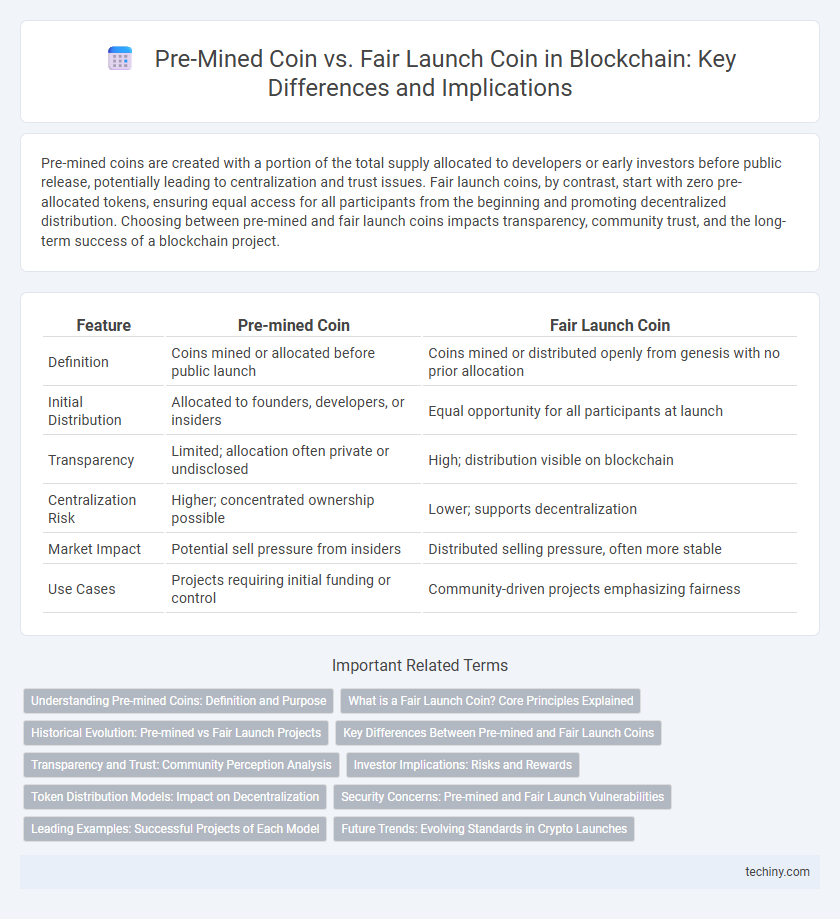Pre-mined coins are created with a portion of the total supply allocated to developers or early investors before public release, potentially leading to centralization and trust issues. Fair launch coins, by contrast, start with zero pre-allocated tokens, ensuring equal access for all participants from the beginning and promoting decentralized distribution. Choosing between pre-mined and fair launch coins impacts transparency, community trust, and the long-term success of a blockchain project.
Table of Comparison
| Feature | Pre-mined Coin | Fair Launch Coin |
|---|---|---|
| Definition | Coins mined or allocated before public launch | Coins mined or distributed openly from genesis with no prior allocation |
| Initial Distribution | Allocated to founders, developers, or insiders | Equal opportunity for all participants at launch |
| Transparency | Limited; allocation often private or undisclosed | High; distribution visible on blockchain |
| Centralization Risk | Higher; concentrated ownership possible | Lower; supports decentralization |
| Market Impact | Potential sell pressure from insiders | Distributed selling pressure, often more stable |
| Use Cases | Projects requiring initial funding or control | Community-driven projects emphasizing fairness |
Understanding Pre-mined Coins: Definition and Purpose
Pre-mined coins are cryptocurrencies with a significant portion of their total supply created and allocated before public release, often reserved for developers, founders, or early investors. This approach aims to fund project development, incentivize teams, or provide initial liquidity, but can raise concerns about centralization and fairness. Understanding the distribution and utilization of pre-mined coins is crucial for assessing a blockchain project's transparency and long-term sustainability.
What is a Fair Launch Coin? Core Principles Explained
A Fair Launch Coin is a cryptocurrency distributed without any pre-mine or early allocation to founders, ensuring equal opportunity for all participants to mine or acquire coins from the start. Core principles include decentralization, transparency, and community-driven governance, promoting trust and preventing centralization of wealth. This approach contrasts with pre-mined coins by eliminating early insider advantages and fostering a more inclusive ecosystem.
Historical Evolution: Pre-mined vs Fair Launch Projects
Pre-mined coins originated as early blockchain projects where a fixed supply was created before public release, enabling founders and insiders to reserve significant portions for development and investment incentives. Fair launch coins emerged later, emphasizing decentralized issuance without prior allocation, exemplified by projects like Bitcoin that distributed tokens solely through mining rewards. The historical evolution from pre-mined to fair launch models reflects a shift towards transparency and community trust in blockchain ecosystems.
Key Differences Between Pre-mined and Fair Launch Coins
Pre-mined coins are created and allocated to founders or developers before public release, often leading to centralized control and potential trust concerns. Fair launch coins begin without any pre-allocation, distributing tokens through mining or staking to ensure equal opportunity for all participants. The key difference lies in initial distribution transparency and decentralization, impacting community trust and network fairness.
Transparency and Trust: Community Perception Analysis
Pre-mined coins often face skepticism due to centralized control and potential manipulation, impacting transparency and trust within the blockchain community. Fair launch coins, distributed equally from inception, typically foster higher community trust by promoting decentralization and equitable access. Transparency in token distribution directly influences investor confidence and long-term project sustainability.
Investor Implications: Risks and Rewards
Pre-mined coins pose higher risks for investors due to potential centralization of coin supply and manipulation by early holders, which can impact market trust and price stability. Fair launch coins offer a more equitable distribution, promoting decentralized ownership and reducing the risk of pump-and-dump schemes, thus appealing to investors seeking transparency and long-term value. Investors should weigh the reward of early gains in pre-mined projects against the increased risk of volatility and governance control.
Token Distribution Models: Impact on Decentralization
Pre-mined coins allocate a significant portion of tokens to founders and early investors before public release, often centralizing control and potentially impacting network trust. Fair launch coins distribute tokens evenly from genesis block mining or staking, promoting broader participation and stronger decentralization. Token distribution models directly influence governance equity, security, and community engagement within blockchain ecosystems.
Security Concerns: Pre-mined and Fair Launch Vulnerabilities
Pre-mined coins often face security concerns due to centralization risks, where early holders or developers control a significant portion of the supply, increasing susceptibility to manipulation and hostile takeovers. Fair launch coins promote decentralization by distributing tokens without pre-allocation, but they can still encounter vulnerabilities such as 51% attacks during initial low-distribution phases. Both models require robust consensus algorithms and community governance to mitigate risks and ensure network integrity.
Leading Examples: Successful Projects of Each Model
Bitcoin exemplifies a fair launch coin, with its decentralized issuance and absence of pre-mining, fostering trust and widespread adoption. Ethereum, initially pre-mined through a public token sale, demonstrated the pre-mined coin model's potential in funding development while maintaining network security. Other notable fair launch coins include Litecoin and Monero, while Ripple (XRP) and Stellar (XLM) are prominent successful projects utilizing pre-mined distribution strategies.
Future Trends: Evolving Standards in Crypto Launches
Future trends in blockchain emphasize evolving standards between pre-mined coins and fair launch coins, reflecting growing demands for transparency and decentralization. Pre-mined coins often face scrutiny due to concerns over initial coin distribution and potential centralization risks, prompting shifts toward fair launch models that prioritize equitable access for participants. The rising preference for fair launch coins signals an industry-wide move toward trustless ecosystems, underpinned by community-driven validation and improved governance frameworks.
Pre-mined Coin vs Fair Launch Coin Infographic

 techiny.com
techiny.com